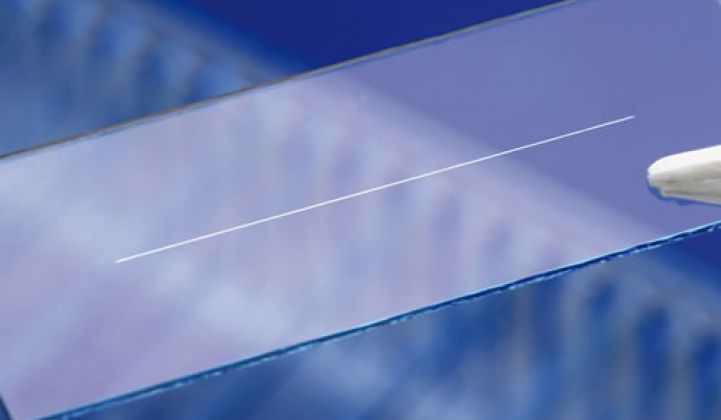Waste not, want not.
That's the theory behind an experimental technique for producing large-format organic light emitting diodes (OLEDs) that could become next-generation TVs and light fixtures. The technique, pioneered by Philips and Fraunhofer Institute, involves putting a mask onto a surface and then applying only a small amount of active material. A laser then melts the material onto the surface. In traditional OLEDs, a large amount of materials are deposited onto a surface and then eliminated.
Ideally, this technique will lead to cheaper -- and larger -- OLEDs, because the material can be placed in a more precise manner than with the good ol' 'spin art' technique. Everyone loves OLEDs, but making big ones and making them cheaply has proven difficult. That's why most OLEDs are used in high-end phones.
Kateeva, a Silicon Valley startup, tackles the problem in a different way: with tiny thermal jet dryers. Sources say large Asian manufacturers have considered the process. (Meanwhile, Qualcomm takes an entirely different approach to thin screens.) Whoever wins here, the research on thin films as energy-efficient screens, monitors and light sources is picking up steam. We might see a commercial dam-break in a few years.
Elsewhere:
--MVR, which makes sustainable plastic resins, bought packaging expert NextLife. With Walmart and other retailers laying down green edicts, manufacturers are trying to figure out how to squeeze fossil fuels out of their packages. Steelcase has mused that mushrooms -- those spongy fungi -- could replace packing peanuts. Steve Jurvetson, the VC at Draper Fisher Jurvetson that tends to move early into new markets (he was an early advocate of synthetic biology), told us earlier this year that recycling has become intriguing. Garbage could be gold. Names to follow: Lehigh Technologies (rubber recycling) Bioplastech (superbugs that recycle plastic) and City Bin (recycling services).
--Suncor will buy 55 1.6-megawatt wind turbines for a wind farm near Calgary. In all, the project will generate 88 megawatts of power. GE and Vestas sit atop the big turbine market and Siemens says it will invest heavily to become a member of the big three by 2012.
--Primo Water, which provides purified water, wants to raise $90.7 million in an IPO this week. Water. Investors love the concept, but have shied away from plunking down money in many instances. Energy Recovery, which makes desalination equipment, held an IPO right before the crash of 2008. The company, however, has since landed several contracts to install its equipment in desal plants around the world.
--In the past few days, we've written about the coming wave of acquisitions in lighting controls and how lighting controls will change demand response. Readers reminded us of two companies in this discussion. Joulex has an HVAC/building management system that can be rigged up quickly. Google, BMW, Daimler and Coke are all testing it. Another: Convergence Wireless and its LoPan/ZigBee/power line compatibility.
--Finally, Nissan reiterated plans laid out earlier this summer to release an electric utility car, an electric Infiniti and an urban car to follow the Leaf.



